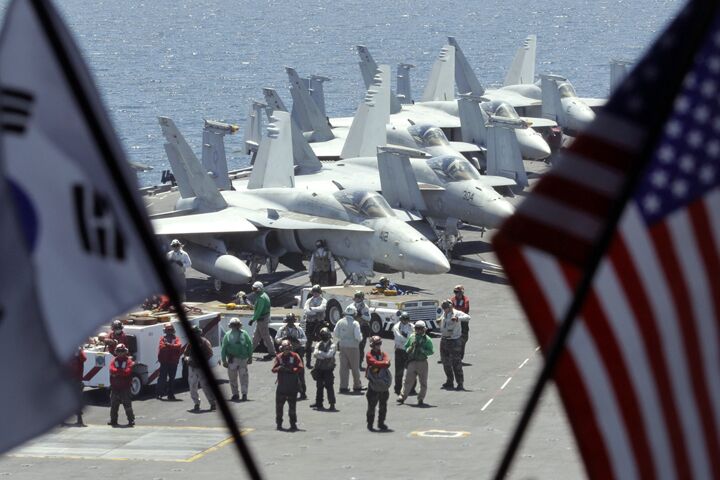
North Korea Exposes America’s Weak Will
North Korean despot Kim Jong Il is threatening the United States with nuclear war over joint naval drills with South Korea.
The exercises, coming four months after a torpedo sunk the South Korean ship Chonan, are intended to be a show of force and unity by the U.S. and South Korea. They include the uss George Washington, a nuclear-powered supercarrier that hosts 70 aircraft and 5,000 personnel.
The U.S. also levied new sanctions against North Korea on July 21. It froze the assets of North Korean leaders and imposed travel bans on some of them.
Titled “Invincible Spirit,” the military exercises involve 8,000 sailors, 200 aircraft and 20 ships. They began on Sunday, lasting till Wednesday. The lead-up to these exercises, however, shows that the spirit behind America’s alliance with South Korea is far from invincible.
A formal investigation into the sinking of the Chonan, publishing its findings in late May, concluded that North Korea was almost certainly responsible. Soon after, the U.S. and South Korea scheduled joint military exercises for early June.
The rapid scheduling of exercises and the presence of the uss Washington were intended to be a strong message of support from the U.S. “[T]he presence of a carrier—still one of the strongest symbols of U.S. military power—would be important from the South Korean perspective to emphasize the depth of American support and that U.S. support was about more than just anti-submarine warfare,” wrote U.S. think tank Stratfor. “The more important message would be the American willingness and capability to counter North Korea, even amid Chinese opposition” (July 13).
But America quickly showed it was not willing to stand up for South Korea. Afraid to antagonize China, it repeatedly delayed the exercises, and discussed holding back the aircraft carrier. As a compromise, the U.S. finally decided to hold the exercises on the east side of South Korea, between the peninsula and Japan, rather than in the Yellow Sea.
South Korea paid close attention to the whole thing. Stratfor wrote (ibid.):
But what Seoul has seen is the U.S. hesitation to fulfill what South Koreans perceive to be a basic and fully justified request of its closest ally in an important—albeit limited—crisis. Watching the United States fail to honor that request for fear of inviting some Chinese ire (the potential deployment of the uss Washington has been all over the Chinese news media and government statements for weeks) has resonated deeply in the South Korean psyche as a sign that the American security guarantee is not reliable.
No wonder Kim Jong Il is unafraid to threaten nuclear war. He can see that his bluster will have no consequences.
“The army and people of the dprk [Democratic People’s Republic of North Korea] will legitimately counter with their powerful nuclear deterrence the largest-ever nuclear war exercises to be staged by the U.S. and the South Korean puppet forces,” North Korea’s official news agency quoted a government official as saying.
North Korea sunk a South Korean vessel. Its punishment? A barely perceptible slap on the wrist from the United Nations Security Council, a few sanctions from the U.S., and being forced to sit and watch these military exercises. Kim Jong Il must already be trying to figure out how much he can get away with next time.
The immediate Korean crisis will blow over. Threatening war when the U.S. and South Korea conduct drills is standard procedure. North Korea is expert at exploiting a crisis to get what it wants at the negotiating table. But South Korea’s distrust of the U.S. will linger.
The important long-term trend to watch following on from this is South Korea increasingly distrusting America. Expect it to draw closer to Asian nations, like China, as it searches for security. Without America clearly behind it, it will have little choice but to make concessions to the nearest rising power.
America’s hesitancy could damage its standing with Japan also. If it concluded America is not willing to stand up for its allies, it could kick American forces out of Japan, and build up its own military power.
For more information on the future of this region, see our free booklet Russia and China in Prophecy.
